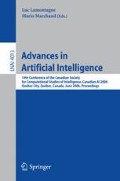Abstract
Quantum Information Processing (QIP) performs wonders in a world that obeys the laws of quantum mechanics, whereas Machine Learning (ML) is generally assumed to be done in a classical world. We initiate an investigation of the encounter of ML with QIP by defining and studying novel learning tasks that correspond to Machine Learning in a world in which the information is fundamentally quantum mechanical. We shall see that this paradigm shift has a profound impact on the learning process and that our classical intuition is often challenged.
Access this chapter
Tax calculation will be finalised at checkout
Purchases are for personal use only
Preview
Unable to display preview. Download preview PDF.
References
Angluin, D.: Queries and concept learning. Machine Learning 2, 319–342 (1988)
Barenco, A., Berthiaume, A., Deutsch, D., Ekert, A., Jozsa, R., Macchiavello, C.: Stabilisation of quantum computations by symmetrisation. SIAM Journal of Computing 26(5), 1541–1557 (1997)
Bennett, C.H., Brassard, G.: Quantum cryptography: Public key distribution and coin tossing. In: Proceedings of IEEE International Conference on Computers, Systems and Signal Processing, Bangalore, pp. 175–179 (1984)
Buhrman, H., Cleve, R., Watrous, J., de Wolf, R.: Quantum fingerprinting. Physical Reviews Letters 87(16), article 167902 (2001)
Chiribella, G., Mauro D’Ariano, G., Perinotti, P., Sacchi, M.: Covariant quantum measurements which maximize the likelihood. Physical Reviews A 70, article 61205 (2004)
Ezhov, A.A., Berman, G.P.: Introduction to Quantum Neural Technologies. Rinton Press (2003)
Freund, Y., Shapire, R.: A decision-theoretic generalization of on-line learning and an application to boosting. Journal of Computer and System Sciences 55(1), 119–139 (1997)
Grover, L.K.: Quantum mechanics helps in searching for a needle in a haystack. Physical Review Letters 79, 325–328 (1997)
Hayashi, A., Hashimoto, T., Horibe, M.: Reexamination of optimal quantum state estimation of pure states. Physical Reviews A 72, article 32325 (2005)
Helstrom, C.W.: Quantum Detection and Estimation Theory. Academic Press, London (1976)
Herzog, U., Bergou, J.A.: Optimal unambiguous discrimination of two mixed quantum states. Physical Reviews A 71, article 50301 (2005)
Holevo, A.S.: Bounds for the quantity of information transmitted by a quantum mechanical channel. Problems of Information Transmissions 9, 177–183 (1973)
Horn, D., Gottlieb, A.: The method of quantum clustering. In: Proceedings of the Conference Neural Information Processing Systems (NIPS), pp. 769–776 (2001)
Nielsen, M.A., Chuang, I.L.: Quantum Computation and Quantum Information. Cambridge University Press, Cambridge (2000)
Peres, A., Wootters, W.K.: Optimal detection of quantum information. Physical Reviews Letters 66(9), 1119–1122 (1991)
Quinlan, J.R.: Induction of decision trees. Machine Learning 1, 81–106 (1986)
Sasaki, M., Carlini, A.: Quantum learning and universal quantum matching machine. Physical Reviews A 66(2), article 22303 (2002)
Sen, P.: Random measurement bases, quantum state distinction and applications to the hidden subgroup problem. In: Proceedings of 21st Annual IEEE Conference on Computational Complexity (CCC) (to appear, 2006)
Servedio, R.: Separating quantum and classical learning. In: Orejas, F., Spirakis, P.G., van Leeuwen, J. (eds.) ICALP 2001. LNCS, vol. 2076, Springer, Heidelberg (2001)
Servedio, R., Gortler, A.: Equivalences and separations between quantum and classical learnability. SIAM Journal of Computing 33(5), 1067–1092 (2004)
Shor, P.W.: Polynomial-time algorithms for prime factorization and discrete logarithms on a quantum computer. SIAM Journal of Computing 26, 1484–1509 (1997)
Valiant, L.G.: A theory of the learnable. Communications of the ACM 27, 1134–1142 (1984)
Wootters, W.K., Zurek, W.C.: A single quantum cannot be cloned. Nature 66, 802–803 (1982)
Ziman, M., Plesch, M., Bužek, V., Štelmachovič, P.: Process reconstruction: From unphysical to physical maps via maximum likelihood. Physical Reviews A 71, article 22106 (2005)
Author information
Authors and Affiliations
Editor information
Editors and Affiliations
Rights and permissions
Copyright information
© 2006 Springer-Verlag Berlin Heidelberg
About this paper
Cite this paper
Aïmeur, E., Brassard, G., Gambs, S. (2006). Machine Learning in a Quantum World. In: Lamontagne, L., Marchand, M. (eds) Advances in Artificial Intelligence. Canadian AI 2006. Lecture Notes in Computer Science(), vol 4013. Springer, Berlin, Heidelberg. https://doi.org/10.1007/11766247_37
Download citation
DOI: https://doi.org/10.1007/11766247_37
Publisher Name: Springer, Berlin, Heidelberg
Print ISBN: 978-3-540-34628-9
Online ISBN: 978-3-540-34630-2
eBook Packages: Computer ScienceComputer Science (R0)

